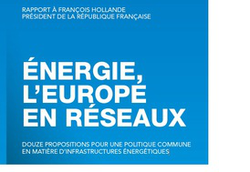March 7, 2015
Bibliographic Reports : Books

It is often argued that energy because it is a matter of sovereignty and because it is rooted in the territory, returns to the State. But it is resolutely towards Europe that Michel Derdevet pulls the whole system.
Probably by conviction, by will of a strong Europe and because there has economic power only when propped on energy. However, an energy system that is up by networks as in energy, we never doubted the convergence between the container and the content, meaning that the energy source is irrelevant whitout being carried, whitout being 'provided to users.
This construction of the networks is political and it is in terms of "mesh" that the report Michel Derdevet just submitted to the President of the Republic, François Hollande, presents a European project. In a way, it is not "revolutionary", as it is to finally fulfill the will of those who conceived Europe in 1945 through the coal, steel and energy, to a common Europe from which built the industry, not only for the reconstruction of Europe but for its economic dynamism and its common security policy.
In this, the European network of the transportation of electricity is essential. Yet it is to be done because the legislation of the European Union rather liberalized energy markets whitout building Europe of energy, leaving remaining national specificities. The result is what Michel Derdevet rightly called "inertia".
He therefore proposes the establishment of an "European industrial project." In this context, Michel Derdevet requires better definition of "model of norms and regulation", aiming in particular the structure of tariffs that include or not the R & D according to the Member States, claiming the alignment of the tasks of network operators and a price guarantee for users, which would facilitate investment. He stressed that national regulatory differences hinder the development of smart grids (and therefore the European market). Without a convergence of regulations, interoperability is not optimal, as it would allow Europe to be a major global player in energy.
Michel Derdevet therefore advocates regulation that goes to both a stronger European articulation, but at the same time which must be more "decentralized", for users to make better use of new uses of energy through the action of regulators they are close.
It is true that we are very far off ...
This is why the author asks what one favors "regulatory convergence". This is not only to harmonize rules but also to redirect them to detach the competitive prism to direct them to the long-term financing.
It is true that Europe's energy, without which a single industrial space can hardly be, can not actually do if the regulation does not resolutely takes over the principle of competition, competition remaining in the moment of exchange, while the Regulation is in the long term and what to take to designate as "industrial policy" which is nothing but a form of expression of the Political.
So what Michel Derdevet request, what ever that finally the arrival of a political Europe, the need for it finds its place in the global competition.

Feb. 17, 2015
Translated Summaries : 05. Energie

In regulatory law, municipalities are very important, as consumers but also as issuers standards. They can do this through contracts but also by unilateral standards such orders.
This power of municipalities is coming to a halt by the decision taken 17 February 2015 by the Supreme Court of the State of Ohio,, State of Ohio ex rel. Jack Morrison Jr., Law Director for City of Munroe Falls, Ohio v. Beck Energy Corp.
Indeed, a municipal law had made provisions for imposing rules on location, drilling and well operations and gas. These provisions were contrary to the law of the State of Ohio.
In its judgment of 17 February 2015, the state Supreme Court considers that this is enough to make the first non-compliant text of the Constitution because it is not possible for a local authority to exercise normative power by contradicting a state standard.
The stakes are certainly legal and lies in the implementation of the hierarchy of norms. But it is also political: in energy, due to the power of the operators, which is most likely not to be captured by the sector? The political power of the state or the political power of municipalities?
As suggested by one of the judges, must be taken into consideration which of the two powers depends most operators in the financing of campaigns.
Factual and determinant consideration, specific element of the US, an element which Kelsen couldn't think .....
Updated: Dec. 20, 2011 (Initial publication: Dec. 20, 2011)
Thesaurus : Doctrine

